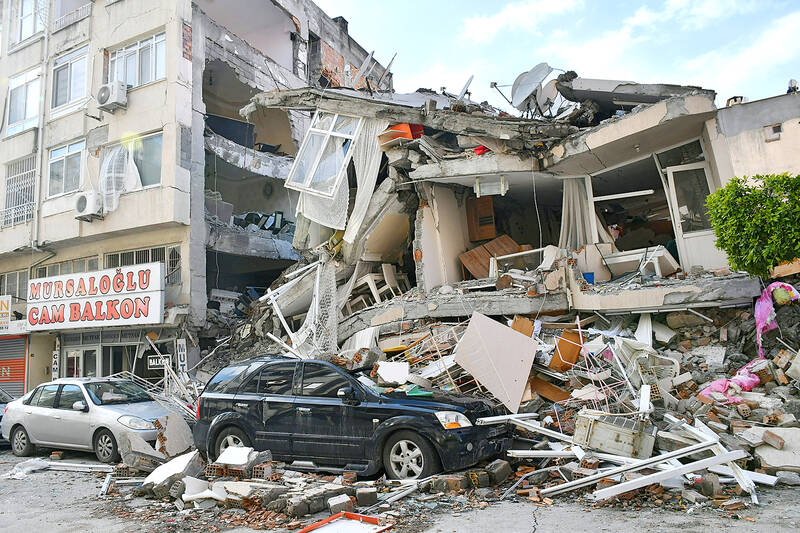Earthquakes are among the most terrifying natural disasters, generating massive tremors and destructive forces as Earth’s crust shudders. These tremors not only lead to the collapse of buildings but can also trigger secondary disasters, such as tsunamis and fires. However, we can mitigate the impact on lives and property by mastering earthquake response techniques.
The DCH three-step strategy, recommended by the Centers for Disease Control and Prevention (CDC), is crucial during an earthquake. “D” stands for “drop.” You should immediately drop to the ground, using your hands and knees to support yourself. This position prevents you from falling and allows you to move if necessary. “C” stands for “cover,” meaning you find shelter under a sturdy table or other structure. If no clear shelter is nearby, try to get close to a column, a piece of low-lying furniture, or a corner of a wall, and cover your head and neck with your arms. “H” represents “hold.” You should firmly grasp your shelter until the shaking stops, always remembering to stay away from objects that could fall. These three simple actions can significantly reduce injuries during earthquakes.
Moreover, it’s important to pay attention to the following safety tips during and after an earthquake. Firstly, it’s essential to avoid using elevators, as power outages could leave you trapped inside. If you are in an elevator, remain calm, press the alarm button, and wait for rescue. In addition, stay away from windows and furniture to prevent injury from shattered glass and falling objects. Lastly, in case of a gas leak, immediately cease using any open flames and turn off the gas supply to prevent the risk of fire or explosion.

Photo: Unsplash / 照片:Unsplash
Earthquakes are unpredictable, but by taking preventive measures in advance, we can protect ourselves and our loved ones.
地震是最可怕的自然災害之一,隨著地球的地殼震顫產生巨大的震動和破壞力。這些震動不僅導致建築物倒塌,還可能引發第二次災害,如海嘯和火災。然而,我們可以通過掌握地震應對技巧來減輕生命和財產的影響。
「DCH」三步策略是由美國疾病管制與預防中心(CDC)所建議,在地震期間非常重要。「D」代表「趴下」。你應立即趴在地上,用手和膝蓋支撐自己。這個姿勢可以防止跌倒,並在必要時讓你移動。「C」代表「掩護」,意思是在堅固的桌子或其他建築下找到避難處。如果附近沒有明確的避難處,請試著靠近柱子、低矮的家具或牆角,用手臂遮蔽頭部和頸部。「H」代表「抓住」。應該緊緊抓住你的避難處,直到震動停止,並記住遠離可能掉落的物體。這三個簡單的動作可以顯著地減少地震期間的受傷情況。
此外,在地震期間和之後,注意以下安全提示也很重要。首先,避免使用電梯,因為停電可能使你被困在內部。如果在電梯中,保持冷靜,按下警報鈕,等待救援。此外,遠離窗戶和家具,以防止因玻璃破碎和物體掉落而受傷。最後,如果發生氣體洩漏,應立即停止使用任何明火並關閉氣體供應以防止火災或爆炸的風險。
地震是不可預測的,但透過提前採取預防措施,我們可以保護自己和我們所愛的人。
MORE INFORMATION
tremor n. 震動
crust n. 外殼;地殼
shudder vi. 震動
tsunami n. 海嘯
low-lying adj. 低矮的
outage n. (機械)運行中斷;停電
mitigate vt. 緩和;減輕
KEY VOCABULARY
1. terrifying adj. 可怕的;令人恐懼的
Rick told a terrifying ghost story that gave us all chills.
瑞克講了一個可怕的鬼故事,讓我們所有人都不寒而慄。
2. massive adj. 巨大的;大量的
The concert attracted a massive crowd of enthusiastic fans and filled the stadium to capacity.
這場演唱會吸引了大量熱情的粉絲,使體育場爆滿。
3. destructive adj. 毀滅性的;有害的
Godzilla is a destructive monster who knocks down buildings.
哥吉拉是一個會推倒建築物的破壞性怪物。
4. collapse n. 倒塌;崩潰
The collapse of the building was caused by structural defects.
大樓倒塌是因結構缺陷造成的。
5. trigger v. 觸發;引起
The sound of breaking glass triggered a memory of last year’s big storm for me.
玻璃破碎的聲音觸發我回想起去年嚴重的風雨。
6. prevention n. 預防;阻止
preventive adj. 預防的;防止的
Prevention is always better than cure when it comes to health.
在健康方面預防總是勝於治療。
7. shelter n. 避難處;庇護所
The hiker built a shelter out of branches when he got lost in the forest.
當這名健行者在森林迷路時,他用樹枝搭建了一間避難處。
8. sturdy adj. 堅固的;結實的
This ladder doesn’t look very sturdy, so I wouldn’t climb it if I were you.
這把梯子看起來不怎麼堅固,如果我是你就不會爬上去。
9. rescue n. 救援;解救
The firefighters performed a daring rescue to save the trapped cat.
消防員執行大膽的救援行動,為拯救那隻受困的貓。
學習音檔: https://magazine.english4u.net/Magdata/menu/vtnnc
《空中美語》雜誌APP免費下載: https://www.english4u.net/apps/index.aspx
免費收聽當月《空中美語》雜誌課文朗讀及解析 !
文章由AMC空中美語授權使用: https://www.english4u.net

In an effort to fight phone scams, British mobile phone company O2 has introduced Daisy, an AI designed to engage phone con artists in time-wasting conversations. Daisy is portrayed as a kindly British granny, exploiting scammers’ tendency to target the elderly. Her voice, based on a real grandmother’s for authenticity, adds to her credibility in the role. “O2” has distributed several dedicated phone numbers online to direct scammers to Daisy instead of actual customers. When Daisy receives a call, she translates the scammers’ spoken words into text and then responds to them accordingly through a text-to-speech system. Remarkably, Daisy

Bilingual Story is a fictionalized account. 雙語故事部分內容純屬虛構。 Emma had reviewed 41 resumes that morning. While the ATS screened out 288 unqualified, she screened for AI slop. She could spot it a mile away. She muttered AI buzzwords like curses under her breath. “Team player.” “Results-driven.” “Stakeholder alignment.” “Leveraging core competencies.” Each resume reeked of AI modeling: a cemetery of cliches, tombstones of personality. AI wasn’t just changing hiring. It was draining the humanity from it. Then she found it: a plain PDF cover letter. No template. No design flourishes. The first line read: “I once tried to automate my

Every May 1, Hawaii comes alive with Lei Day, a festival celebrating the rich culture and spirit of the islands. Initiated in 1927 by the poet Don Blanding, Lei Day began as a tribute to the Hawaiian custom of making and wearing leis. The idea was quickly adopted and officially recognized as a holiday in 1929, and leis have since become a symbol of local pride and cultural preservation. In Hawaiian culture, leis are more than decorative garlands made from flowers, shells or feathers. For Hawaiians, giving a lei is as natural as saying “aloha.” It shows love and

1. 他走出門,左右看一下,就過了馬路。 ˇ He walked outside, looked left and right, and crossed the road. χ He walked outside and looked left and right, crossed the road. 註︰並列連接詞 and 在這句中連接三個述語。一般的結構是 x, y, and z。x and y and z 是加強語氣的結構,x and y, z 則不可以。 2. 他們知道自己的弱點以及如何趕上其他競爭者。 ˇ They saw where their weak points lay and how they could catch up with the other competitors. χ They saw where their weak points lay and how to catch up with the other competitors. 註:and 一般連接同等成分,結構相等的單詞、片語或子句。誤句中 and 的前面是子句,後面是不定詞片語,不能用 and 連接,必須把不定詞片語改為子句,and 前後的結構才相等。 3. 她坐上計程車,直接到機場。 ˇ She took a cab, which took her straight to the airport. ˇ She took a cab and it took her straight